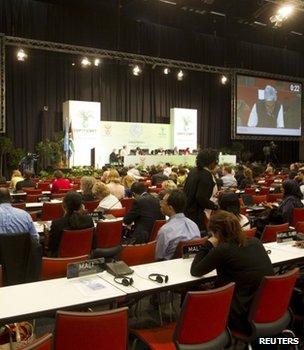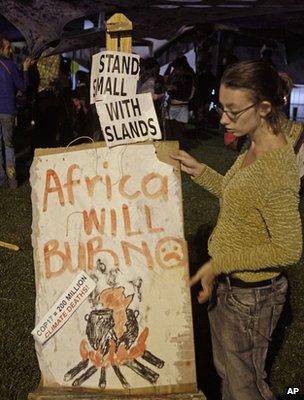UN climate talks publish revised draft text
- Published
- comments

Delegates will resume efforts on Saturday morning to reach an agreement that suits all sides
Nations at the UN climate talks appear to be edging their way to agreeing that a process towards a new carbon-cutting deal should start in the New Year.
A draft text circulated by the South African host government, external says the new agreement should be in place by 2015.
All nations would be included, though the exact legal nature is not clear.
The move marks a success for the ad-hoc alliance formed between the EU and scores of the world's most climate-vulnerable countries.
Earlier drafts had said negotiations should not begin until 2015, and should not take effect until 2020.
The new version does not specify a date from which the new agreement should come into force.
But it does for the first time explicitly endorse the fact that there is a mismatch, a gap, between the pledges countries have made on cutting emissions and their stated goal of keeping the rise in average global temperatures since pre-industrial times below 2C (3.6F).
The draft emerged around midnight in Durban as negotiators on many of the other detailed strands of the UN climate process were settling in for a long night's work.
It will be formally discussed on Saturday morning, with the meeting expected to conclude late in the day.
Ministers from the Alliance of Small Island States (Aosis) had greeted the earlier draft with anger.

Protesters say the talks are not doing enough to prevent dangerous climate change
"It doesn't have enough ambition, the legal arrangements are ambiguous, and the time-frame doesn't work for us," said Dessima Williams, Grenada's UN Ambassador.
"Most of the important ingredients are to take place after 2020, and that's just not soon enough for us."
The earlier draft text had closely resembled the positions of the BASIC group - Brazil, South Africa, India and China - and the US.
One seasoned observer of the UN process said the proposals "buy 10 years' delay in action for the US, China, India and Brazil, and risk making the most vulnerable countries 'road kill' on the big emitters' highway to the future."
Aosis produced its own text, some of which appears to have found its way into the new draft.
How the new version will be greeted by the BASIC group and the US is not yet clear.
The EU, Aosis and the Least Developed Countries (LDCs) bloc may also ask for tighter wording on the legal side, emphasising that they want the new agreement to be genuinely legally-binding.
Finger pointing
India has been accused of being one of the main countries blocking a progressive deal here, along with China and the US.
But India's Environment Minister, Jayanthi Natarajan, said this was not the case.
She said her concern had been to understand what the EU "roadmap" to a new agreement involved.
"I don't find myself at odds [with Aosis] at all, I think I share their concerns - they want quick action, we want quick action," she told BBC News.
"The fact of the matter is there should be very quick action, and my very quick action is that want a review of what Annex One countries have done and we want to know how far they've gone, and I'm willing to listen to what Aosis says."
She said the "firewall" marked in the UN climate process at its origin in 1992, which divided the world into Annex One - rich countries with commitments to reduce emissions - and everyone else, must be maintained.
Annex One states bore responsibility for their earlier greenhouse gas emissions, she said.
A number of observers suggested that of the BASIC bloc, Brazil and South Africa were minded to move towards the EU/LDCs/Aosis position - and if China did likewise, India and the US would then come under intense pressure to give ground.
Rising anger
The main lobby of the conference centre in Durban, South Africa, saw a long demonstration on the final afternoon, with campaigners demanding progress.
"Listen to the people, not the polluters," they chanted.
The last of the demonstrators was led away about an hour-and-a-half later.
Greenpeace International executive director Kumi Naidoo was among those escorted from the conference centre for leading the protest.
"The United States delegation is right now organising, line-by-line, the means by which United Nations member states will be eradicated from the map," he said.
"I ask the proud American people, in whose name this is being done, to take just a moment today to consider what they would do if they learned that a conference of powers was plotting to wipe their great nation off the map, because for low-lying islands that is the future they face."
Follow Richard on Twitter, external
- Published7 December 2011
- Published5 December 2011
- Published23 November 2011
- Published21 October 2011